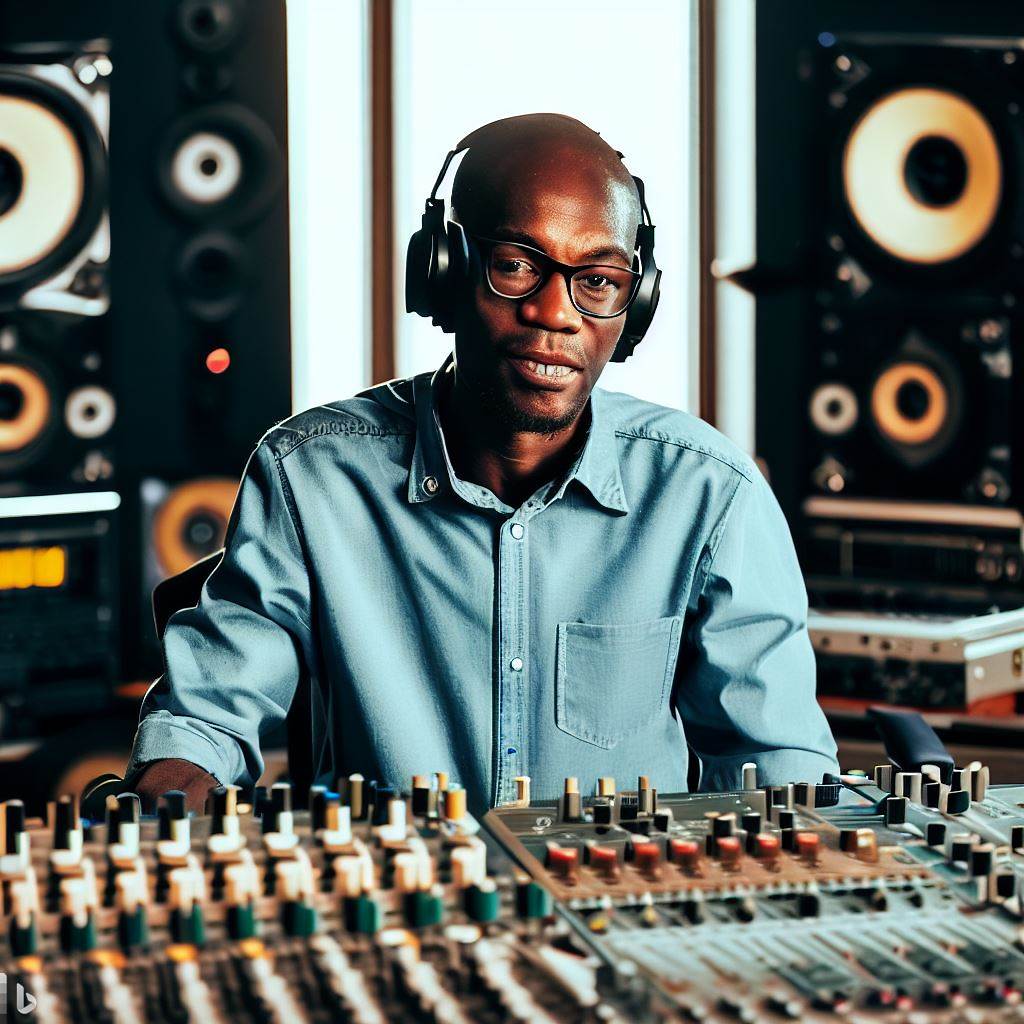Introduction
In Nigeria, the importance and demand for mixing engineers are constantly increasing. These professionals play a crucial role in creating and enhancing the sound quality of music productions.
If you aspire to become a successful mixing engineer, here are the steps to follow:
- Develop a strong foundation in music production and sound engineering.
- Acquire the necessary technical skills and knowledge through formal training or self-study.
- Build a portfolio by working on various projects and gaining practical experience.
- Network with industry professionals and collaborate with artists and musicians.
- Stay updated with the latest trends, techniques, and equipment in audio mixing.
In this blog post, we will delve deeper into each step and provide insights, tips, and resources to help you kick-start your journey towards becoming a successful mixing engineer in Nigeria.
From understanding the importance of music production to mastering the technical aspects of sound engineering, we will cover all the essential aspects you need to know.
Whether you are a budding mixing engineer or someone looking to improve their skills, this blog post will serve as a comprehensive guide to navigate the Nigerian music industry and pursue a successful career in audio mixing.
So, without further ado, let’s dive into the exciting world of music production and discover the art of mixing!
Understanding Mixing Engineering
The role and responsibilities of a mixing engineer
A mixing engineer plays a crucial role in the production of music by combining different audio elements to create a balanced and polished final product. The responsibilities of a mixing engineer include:
- Audio balancing: A mixing engineer ensures that all the elements of a track blend well together, adjusting the volume levels of each instrument and vocal to achieve a cohesive sound.
- Equalization: Using EQ techniques, a mixing engineer enhances or reduces specific frequencies to make the track sound more pleasing and clear.
- Compression: By using compression, a mixing engineer controls the dynamic range of the audio, making softer sounds louder and louder sounds softer, resulting in a more consistent and controlled sound.
- Effects: Mixing engineers use effects such as reverb, delay, and modulation to add depth, space, and character to the audio, creating a unique sonic experience.
- Panning: A mixing engineer positions the audio elements within the stereo field, creating a sense of width and separation, making the track more immersive.
Importance of technical skills, creativity, and attention to detail
Technical skills, creativity, and attention to detail are vital for a successful mixing engineer in Nigeria. Here’s why:
- Technical skills: A mixing engineer should have a thorough understanding of various audio equipment, digital audio workstations, plugins, and signal processing techniques.
This knowledge allows them to manipulate the audio effectively. - Creativity: A mixing engineer needs to think outside the box and bring unique ideas to the table to make the music stand out.
Experimenting with different techniques can lead to innovative and captivating mixes. - Attention to detail: Every element of a mix matters, from the micro-level adjustments to the overall balance.
A mixing engineer must have a keen ear and be able to spot and address any imperfections or inconsistencies in the audio.
In the end, a successful mixing engineer in Nigeria should possess a combination of technical skills, creativity, and attention to detail.
By mastering the art of audio balancing, equalization, compression, effects, and panning, they can transform raw audio recordings into professional and captivating tracks.
It’s important for aspiring mixing engineers to continuously learn and improve their skills to stay competitive in the ever-evolving music industry.
Read: Nigeria’s Most Influential Journalists: A Profile Series
Gaining Knowledge and Experience
Formal Education
Obtaining a degree or diploma in music production or audio engineering has several benefits. It provides a solid foundation in technical skills, theoretical knowledge, and industry best practices.
Reputable institutions in Nigeria that offer relevant courses include:
- Nnamdi Azikiwe University, Awka – Department of Music
- University of Lagos – Department of Creative Arts
- Obafemi Awolowo University – Department of Music
- Lagos State University – Department of Theatre Arts and Music
- Redeemer’s University, Ede – Department of Performing Arts
Self-Education
- Online tutorials, courses, and resources are valuable for learning mixing techniques and tools.
- Websites like Coursera, Udemy, and Skillshare offer comprehensive courses on audio engineering and mixing.
- It is important to practice regularly and experiment with different genres to enhance skills.
Participate in Internships or Apprenticeships
- Explore opportunities to work under experienced mixing engineers or in recording studios.
- Internships and apprenticeships provide invaluable hands-on experience and mentorship.
- Building connections in the industry through these opportunities can lead to future job prospects.
Read: Inside the Studio: The Life of a Nigerian Mixing Engineer
Developing Essential Skills
Technical Skills
Understanding sound theory, signal flow, and various audio equipment is fundamental for a successful mixing engineer.
With a solid foundation in sound theory, a mixing engineer can make informed decisions about how to process and manipulate audio signals.
This understanding enables them to achieve the desired sound and create a balanced mix.
In addition to understanding sound theory, proficiency in popular digital audio workstations (DAWs) used for mixing is crucial in the modern music industry.
These software platforms offer a wide range of tools and plugins that allow mixing engineers to shape and enhance audio.
Being proficient in these DAWs is necessary to navigate through the interface, use the different functions effectively, and optimize workflow.
Ear Training
Developing a good ear for audio dynamics, frequencies, and spatial effects is essential for professional mixing. A trained ear allows a mixing engineer to identify and address any imbalances or issues in a mix.
This skill helps to create a polished and cohesive sound that compliments the music and enhances the listening experience.
Improving listening skills can be achieved through exercises and techniques specifically designed for ear training.
These exercises focus on developing the ability to hear subtle nuances, identify different frequencies, and recognize spatial effects.
Regular practice and exposure to a variety of music genres can further sharpen a mixing engineer’s ear.
Communication and Collaboration
Effective communication with clients, artists, and producers is key to understanding their vision and meeting their expectations.
Clear and concise communication ensures that the mixing engineer can deliver a mix that aligns with the artistic direction and goals of the project.
Additionally, building strong relationships through effective communication can lead to repeat business and referrals.
The ability to collaborate and incorporate feedback into the mixing process is crucial for a successful mixing engineer.
Collaboration requires active listening, open-mindedness, and a willingness to adapt and experiment based on feedback.
By working closely with artists and producers, a mixing engineer can create a final mix that fully represents their creative intentions.
In fact, developing essential skills is crucial for becoming a successful mixing engineer in Nigeria.
Technical skills, including a deep understanding of sound theory and proficiency in popular DAWs, are foundational for effective mixing.
Ear training enhances a mixing engineer’s ability to create balanced and polished mixes.
Finally, effective communication and collaboration skills enable a mixing engineer to understand and meet the expectations of clients, artists, and producers.
By focusing on these skills, aspiring mixing engineers can elevate their craft and thrive in the Nigerian music industry.
Read: The Impact of Nollywood on Sound Editing in Nigeria
Building a Professional Portfolio
When it comes to becoming a successful mixing engineer in Nigeria, one crucial aspect to focus on is building a professional portfolio.
The significance of creating a portfolio showcasing past mixing projects
- A portfolio demonstrates your skills and experience to potential clients and employers.
- It serves as tangible evidence of your capabilities as a mixing engineer.
- Include samples that highlight your ability to enhance the sound quality of different tracks.
- Showcasing past projects builds credibility and trust with clients.
Importance of quality over quantity and selecting diverse genres to display versatility
- Focus on quality rather than the quantity of projects in your portfolio.
- Choose your best mixing works that truly showcase your expertise.
- Include a variety of genres in your portfolio to demonstrate versatility as a mixing engineer.
- Having diverse genres shows your ability to adapt and deliver excellent results regardless of the music style.
- Consider including both well-known and lesser-known artists to demonstrate your range of clientele.
Advice on organizing and presenting the portfolio
- Create a visually appealing and user-friendly website or online platform to showcase your portfolio.
- Include a brief introduction and background about yourself as a mixing engineer.
- Clearly label and categorize each project, including the artist name and genre.
- Add a brief description of your contribution and achievements in each project.
- Consider including before and after sound samples to demonstrate your skills and improvements.
Encouraging continuous updating and improvement of the portfolio
- Regularly update your portfolio with your latest and best mixing projects.
- Remove outdated or weaker samples to maintain a high standard.
- Seek feedback from fellow professionals or mentors to improve your portfolio presentation.
- Stay updated with industry trends and advancements to incorporate new techniques into your work.
The importance of networking and collaborating to expand the portfolio
- Collaborate with other music professionals, such as producers, artists, and fellow engineers, to expand your portfolio.
- Networking allows you to work on different projects and gain exposure to new genres.
- Connect with industry influencers and participate in music events and workshops to build relationships.
- Join online communities and forums to find potential collaboration opportunities and gain exposure.
Building a professional portfolio is essential for any aspiring mixing engineer in Nigeria. It serves as a powerful tool to attract clients, showcase skills, and demonstrate versatility.
Remember to focus on quality, diversity, and continuous improvement to stand out in a competitive industry.
Read: Media Laws and Ethics for Journalists in Nigeria

Networking and Marketing Yourself
Networking and marketing yourself are crucial steps towards becoming a successful mixing engineer in Nigeria.
Building connections with musicians, producers, and fellow audio professionals can open doors to new opportunities and collaborations. Here are some tips on how to effectively network and market yourself:
Importance of Networking
- Networking allows you to meet and connect with musicians, producers, and audio professionals who can potentially hire you for mixing projects.
- Building relationships with industry insiders can lead to recommendations and referrals, increasing your chances of landing high-profile gigs.
- Networking helps you stay updated on the latest trends, techniques, and technology in the audio industry.
- Collaborating with fellow professionals can expand your knowledge and skill set, enabling you to offer a wider range of services to clients.
Recommended Networking Strategies
- Attend industry events such as music festivals, conferences, and workshops. These gatherings provide opportunities to meet influential individuals and showcase your talents.
- Join online communities and forums dedicated to music production. Engage in discussions, share your work, and seek feedback from experienced professionals.
- Utilize social media platforms like Instagram, Twitter, and LinkedIn to promote your work and connect with potential clients. Regularly post updates, samples of your work, and engage with followers.
- Collaborate with local musicians and offer to mix their tracks for free or at a discounted rate. This can help you build your portfolio and gain valuable experience.
- Ask for testimonials and recommendations from clients you’ve worked with. These testimonials can be used to showcase your skills and professionalism to potential clients.
- Offer your services to local recording studios or production houses as a freelance or assistant engineer. This can help you establish relationships with established professionals in the industry.
- Stay active in the music community by attending music showcases, open mic nights, and local concerts. This allows you to network with musicians and build a reputation within the local scene.
- Continuously learn and improve your skills by enrolling in workshops, seminars, and online courses. This shows your dedication to your craft and positions you as a knowledgeable professional.
By actively networking and marketing yourself, you increase your visibility and create opportunities for growth as a mixing engineer in Nigeria.
Remember to approach networking with genuine interest and a willingness to collaborate, as building long-lasting relationships is key in this industry.
Continuing Education and Growth
As a mixing engineer in Nigeria, it is crucial to prioritize continuing education and personal growth in the field of audio engineering.
By staying up-to-date with industry trends and advancements, you can enhance your skills and ensure long-term success.
Ongoing learning and keeping up with industry trends and advancements
Here are some valuable ways to encourage ongoing learning and development:
- Attend Workshops, Seminars, and Conferences: Regularly participating in audio engineering events provides opportunities to learn from industry experts, gain new insights, and network with like-minded professionals.
- Stay Connected: Engage with online communities, forums, and social media groups dedicated to audio engineering.
These platforms allow you to exchange ideas, ask questions, and keep up with the latest news and trends in the industry. - Seek Mentoring: Finding a mentor who is an experienced mixing engineer can greatly accelerate your learning process.
A mentor can offer guidance, share real-world experiences, and provide valuable feedback on your work. - Invest in Quality Resources: Build a library of books, online courses, and instructional videos that focus on various aspects of audio engineering.
- Experiment and Practice: Set aside dedicated time to experiment with new plugins, software, and different mixing styles.
By practicing regularly, you can refine your skills, discover your unique sound, and stay ahead of the competition. - Collaborate with Others: Partnering with musicians, producers, and fellow engineers can expose you to different perspectives and approaches.
Collaborations offer opportunities to learn from each other, expand your network, and create a diverse portfolio of work. - Stay Tech-Savvy: Embrace technological advancements in the audio engineering field.
Keep yourself informed about the latest hardware, software, and emerging techniques to stay relevant and deliver high-quality mixes. - Learn from Mistakes: Embrace failures as opportunities for growth. Analyze past mixing projects, identify areas for improvement, and apply those lessons to future work.
Continuous self-assessment and adaptation are fundamental for success. - Stay Passionate: Fuel your enthusiasm for audio engineering by constantly exploring new music genres, attending live performances, and engaging with the vibrant Nigerian music scene.
Passion drives excellence and keeps your creativity alive.
Conclusion
To become a successful mixing engineer in Nigeria, follow these key steps:
- Develop a strong passion and interest in music.
- Invest in high-quality recording and mixing equipment.
- Gain knowledge and experience through formal education or online courses.
- Network with industry professionals and build connections in the music industry.
- Start working on small projects and gradually build your portfolio.
- Continuously improve your skills by practicing and staying updated with new techniques.
- Showcase your work by creating an online presence through websites and social media.
- Provide excellent customer service and maintain professionalism in all your interactions.
- Constantly seek feedback and learn from constructive criticism.
By taking these steps and being dedicated to your craft, you can kickstart your journey towards becoming a successful mixing engineer in Nigeria.
Don’t wait any longer! Start now and take action. Begin learning, practicing, and networking with professionals in the industry.
The sooner you start, the closer you’ll be to achieving your dream of becoming a successful mixing engineer in Nigeria!




